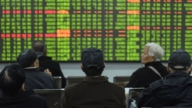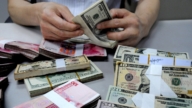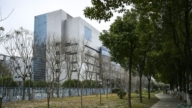【新唐人2013年04月27日訊】當今的中國,拉動經濟的三駕馬車已經停步,宏觀調控也屢屢受挫。4月26號,中共中央政治局常務委員會召開會議,研究當前經濟形勢和經濟工作。外界指出,中國現實的經濟困局,擠壓了宏觀調控政策的空間,那麼,在這次會議中強調的「釋放內需潛力」,能不能成為中共走出困境的解藥,請看專家分析。
中共中央政治局常務委員會召開的會議指出,中國經濟運行仍面臨一些困難和挑戰,要繼續實施財政政策和穩健的貨幣政策。
大陸經濟學家茅於軾:「中國的問題都出在微觀上,通過宏觀調節解決不了問題。微觀上的問題很大,土地不能自由買賣,人民幣沒有國際化,很多行業不允許進入,民間資本不能進入,這都是微觀上的問題。還有糧食問題,搞那個18億畝耕地『紅線』,這都是極其錯誤的政策。」
《路透社》北京時間4月25號發表了一篇題為「中國經濟現實困局擠壓宏觀調控政策空間」的文章,其中指出,中國經濟面臨的困局與五年前的全球金融危機來襲時有點類似,只不過五年前還有4萬億元人民幣的經濟刺激計劃,但眼下可供選擇的政策空間卻著實有限。
同時,30年來拉動中國經濟的三駕馬車,也被外界認定已經不再發揮作用。因此會議提出,要著力「釋放內需潛力」。
茅於軾:「要增加GDP中間的消費比例,是個涉及面很廣的問題,包括稅務改革,包括國民大企業的改革,這些都不動的話,消費改善有限,按現在的格局,沒有甚麼潛力了,改變政策才會有潛力,你要增加消費首先要增加收入啊,沒有收入,他哪來的消費啊。」
會議還強調,抓好「房地產市場調控」和「住房保障」工作。
旅美經濟學家簡天倫博士認為,中國整個宏觀經濟策略完全錯誤,因為土地國有化,和中國房地產市場的不正常現象,致使房價「屢調屢漲」。
旅美經濟學家簡天倫:「政府現在財政最大的收入,是用賣地來賺錢,所以賣地就越賣越高,因為是國有的,如果土地私有的話也不會這樣,這是一方面。另外一方面,現在擁有房子除了資金成本外,他占有房子、占有土地等等,這些並不需要交錢給政府。」
簡天倫進一步指出,正因為這些原因,地方政府和開發商串通起來,在開發商得到價格便宜的土地時,用這些房子賄賂官員,造成一人擁有上百套房子的怪象,出現大量「鬼城」,「空城」。
簡天倫還說,這些無償得到房子的官員們,不會在乎20%的增值稅。
簡天倫:「那為甚麼最近中國推出了賣房20%收益要增稅,不但房價沒減還上漲了呢?需求超過供給,這樣賣的人可以把成本轉嫁到買房人身上去,這種中國的宏觀經濟的扭曲不會改變,而且貧富不均更造成房價的上漲,兩個互相推動,房價上漲也使貧富不均加大。」
美國著名投資公司GMO發表的一份研究報告指出,為了應對全球金融危機和出口訂單的崩潰,中國下令銀行放貸。去年,新增的銀行貸款相當於29%的GDP。這些貸款大部分流向基礎設施、房地產、以及國有企業。這種經濟刺激,會留下可拍的後遺症。
報告說,房地產的繁榮為腐敗提供了巨大的機會。土地經常被奪走,交給開發商,而對被拆遷者補償不足。金融部門沉迷於拿回扣。基礎設施支出,讓地方官員有機會中飽私囊,對劣質建材視而不見。
報告還指出,系統性腐敗降低了中國經濟增長質量,因此,造成金融體系脆弱,環境退化和敏感,執法強制腐壞而無效,基建不安全,公共衛生服務麻木不仁以及監管系統搖搖慾墜。
採訪編輯/劉惠 後製/鍾元
Will Boosting Domestic Demand Help China?
In China today, the economic Troika has stopped working.
In addition, the macro-control has often been interrupted.
On April 25th, the Standing Committee held a meeting
to study the current economic situation and related tasks.
Observers point out, China’s current economic predicament
has tightened the space for macro-control policies.
Will their focus on “bringing out the potential of domestic
demand” become the cure for the economic plight?
It was pointed out during the Standing Committee meeting,
that China’s economy still faces difficulties and challenges.
Continuing implementation of fiscal policy
and prudent monetary policy is necessary.
Mao Yushi, Mainland economist : “China’s problems come
from the microeconomics, which cannot be resolved by macroeconomic adjustments. From microeconomic perspective, there are many issues,
such as the land cannot be freely traded;
RMB is not internationalized;
and many industries and private capital cannot enter.
Food supply and the limited 295 million acres
of arable land are all problems too. “
On April 25th, British Reuters published an article on China’s
economic realities predicament and macro-control policy.
It says, the dilemma China faces today
is similar to that of the global financial crisis five years ago.
With the exception that there were
4 trillion Yuan economic stimulus plan at that time.
At present, option policies are very limited. Observers think,
the economic Troika is no longer effective, after 30 years.
Thus, it was suggested in the meeting to focus on
“bringing out the potential of domestic demand.”
Mao Yushi: “Increasing GDP’s consumer spending share
has many issues, like tax’ and large state enterprises’ reform.
If they remain the same,
there will only be limited improvement in consumption.
Currently, only changing of policy
can result in increasing potentials.
To increase consumption, you must first increase income;
without an income, how can you boost consumption?”
The meeting also stressed on the good grasp of real estate
market regulation and housing market security.
Jian Tianlun, Chinese economist in the US, believes,
China’s macroeconomic policy is entirely wrong.
Due to the nationalization of land and the real estate
market irregularities, housing prices continue to rise.
Jian Tianlun:“The main revenue of local governments
comes from land-selling.
If private ownership of land was in place,
this would not happen.
Once having house and land, one does not need
to hand his money over to the government.”
Jian Tianlun further points out that for these very reasons,
officials have colluded with real estate developers.
Officials supply them with cheap land,
and in return are ‘rewarded’ with free housing units.
Thus, it is not uncommon for a person in China
to own more than 100 housing units.
Therefore, one can see “ghost towns” or “empty cities”
popping up here and there.
When these officials can obtain free housing units,
they don’t mind paying the 20% tax surcharge.
Jian Tianlun: “That’s why recently housing prices went up,
even with 20% surcharge of tax from selling a housing unit.
Simply put, the demand exceeds the supply,
and the owners can add the surcharge to the selling price.
The uneven distribution of wealth,
and the housing price’ increase are forming a vicious cycle;
the bigger the increase of house prices,
the bigger the gap between rich and poor.”
The well-known U.S. investment firm GMO
published a research report on China’s stimulus measures.
It says that in response to the global financial crisis,
and export orders collapse, China ordered the banks to lend.
Last year, new bank loans were equivalent to 29% of GDP.
Most of these loans flowed to the infrastructure, real estate, as well as state-owned enterprises.
This stimulus would lead to terrible aftermaths,
the research predicts.
The report also said that this real estate boom
offers great opportunities for corruption.
Land is often forcefully gained; developers underpay
owners of properties; officials are addicted to kickbacks.
As to infrastructure spending, local officials have many
opportunities to fill their pockets too, by turning a blind eye to the poor quality of building materials.
The report also noted that the systemic corruption
has lowered the quality of China’s economic growth.
That results in a fragile financial system,
environmental degradation, inadequate law enforcement,
unsafe infrastructure, unresponsive public health services,
and crumbling regulatory systems.


























